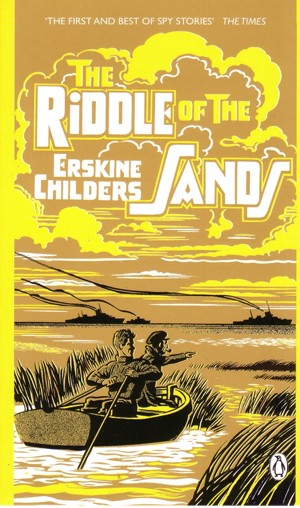
 Although it wasn’t the first story ever written about spies, The Riddle of the Sands: A Record of Secret Service by Erskine Childers can be described as the blueprint for subsequent writers in the genre including John Buchan, William Tufnell Le Queux and Somerset Maugham, all of whom wrote novels focusing on the period around World War I and warned of the growing likelihood of German invasion.
Although it wasn’t the first story ever written about spies, The Riddle of the Sands: A Record of Secret Service by Erskine Childers can be described as the blueprint for subsequent writers in the genre including John Buchan, William Tufnell Le Queux and Somerset Maugham, all of whom wrote novels focusing on the period around World War I and warned of the growing likelihood of German invasion.
The spy thriller genre had already been explored in the 19th century but the stories had more of an adventurous feel to them. Think of Anthony Hope’s The Prisoner of Zenda (1894), and Baroness Orczy’s The Scarlet Pimpernel (1905), for instance. The real turning point came in the 1890s with the Dreyfus Affair in France, which questioned the importance of the state and its interests versus individual liberty… not to mention justice. The case sparked the literary imagination with novels exploring the idea of threats to national security. Childers played on people’s fears, making the threat of conspiracy seem possible and even likely. British writer Eric Ambler did the same with his 1940 novel, Journey into Fear, and Ian Fleming continued the theme in his James Bond novels in the 1960s.

Robert Erskine Childers
About the author…
Childers was an interesting personality. Born to a British father and an Anglo-Irish mother, the young Erskine and his siblings were sent to live with his mother’s family in County Wicklow after the early deaths of their parents. Despite his very English education and service in the British Army during the Boer War and World War I, Childers felt a strong affinity to his Irish roots. Later in life he would rise up against the British in Ireland, opposing the idea of Empire and fighting for the country’s freedom.
Published in 1903, Childers actually started writing The Riddle of the Sands in 1901. The novel draws upon his own political background and experience as a sailor. He was introduced to yachting by a former schoolfriend, Walter Runciman. In the 1890s, Childers had embarked on several trips to the Frisian Islands in the English Channel, where his book is set. It is thought that much of the sailing information he used was taken from his own travel journals. The book seems prophetic today, highlighting that more than a decade prior to The Great War, conflict with Germany was not unexpected.
The story revolves around Charles Carruthers, a minor Foreign Office official, who is invited to go on a sailing and duck shooting holiday in the Friesians by an old friend from his Oxford days, Arthur Davies. Having no other plans, Carruthers agrees to meet Davies at Flensburg on the Baltic Sea. From there, the pair head to the Frisian Islands on Davies’ small sailing boat, Dulcibella. Once there, Carruthers gradually begins to learn the real reason for Arthur’s invitation. Arthur believes that something suspicious is going on after he was nearly killed on a previous trip, when a German yacht attempted to lure him onto a shoal – a submerged bank – during rough weather. Despite attempts to warn the relevant British authorities, no-one will listen to him, hence his invitation to Charles.

Michael York and Simon MacCorkindale in the 1979 film.
A bit of intelligence gathering
The two men embark on their own mission to find out what the Germans are up to. In the process they are warned off by a German yacht and later find themselves walking straight into the lion’s den to find out exactly what the German navy is up to. A dangerous endeavour as they are thought to be spies and one slip-up could get them killed. What’s just as fascinating is that in 1910, inspired by the book, two amateur yachtsmen embarked on a similar trip to the Frisians and indulged in a little information gathering about the German naval bases while they were there. The two men were captured, tried and imprisoned for four years, but released in 1913 when they were pardoned by Kaiser Wilhelm II.
The Riddle of the Sands was a wake-up call in its day, showing how vulnerable the British coastline was to attack. The fictitious plan of the Germans in the story, to pinpoint weak spots for invasion, was not at all beyond the realms of possibility. The book was written at a time when anti-German feeling was starting to grow and it was seen as quite a patriotic read. Its success was instant, appealing to British readers and becoming a bestseller. Although it was to be Childers’ only work of non-fiction, he would go on to write about the threat to the British shoreline in the years preceding the outbreak of war in military publications.
My first contact with the story was the 1979 film starring Michael York as Charles Carruthers and Simon MacCorkindale as Arthur Davies. (You can watch it on YouTube, below.) It was an adaptation that inspired me to read a book that is not only a fantastically well-crafted spy thriller, but an interesting historical insight into the pre-WWI British mindset. The irony is that it was written by a man who was later executed for treason in 1922 for his involvement in Ireland’s struggle for independence.
Classics in September 2016 is sponsored by Bloomsbury Reader.










